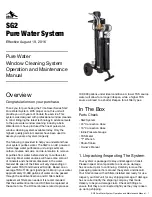
2
Installing 8890 GC Columns
To Install a Capillary Column in a Split/Splitless Inlet
38
5977B Series MSD Operating Manual
To Install a Capillary Column in a
Split/Splitless Inlet
Materials needed
•
Gloves, clean
•
Large (8650-0030)
•
Small (8650-0029)
•
Metric ruler
•
Wrench, open-end, 1/4-inch and 5/16-inch (8710-0510)
•
Capillary column
•
Column cutter, ceramic (5181-8836) or diamond (5183-4620)
•
Ferrules
•
0.27-mm id, for 0.10-mm id columns (5062-3518)
•
0.37-mm id, for 0.20-mm id columns (5062-3516)
•
0.40-mm id, for 0.25-mm id columns (5181-3323)
•
0.5-mm id, for 0.32-mm id columns (5062-3514)
•
0.8-mm id, for 0.53-mm id columns (5062-3512)
•
Inlet column nut (5181-8830 for Agilent 7890/7820 and 8890/8860 GCs)
•
Magnifying loupe
•
Septum (may be old, used inlet septum)
To install columns in other types of inlets, refer to your GC User Information.
WARNING
The GC operates at high temperatures. Do not touch any parts of the GC until
you are sure they are cool.
WARNING
Always wear safety glasses when handling capillary columns. Avoid
puncturing your skin with the end of the column.
CAUTION
Always wear clean gloves while handling any parts that go inside the GC or
analyzer chambers.
Summary of Contents for 5977B CI MSD
Page 1: ...Agilent 5977B Series MSD Operating Manual ...
Page 12: ...12 5977B Series MSD Operating Manual ...
Page 34: ...1 Introduction To Replace the Primary Fuses 34 5977B Series MSD Operating Manual ...
Page 142: ...5 Operating in EI Mode To Pumpdown the MSD 142 5977B Series MSD Operating Manual ...
Page 252: ...8 CI Maintenance To Install the CI Source 252 5977B Series MSD Operating Manual ...
Page 253: ......
















































